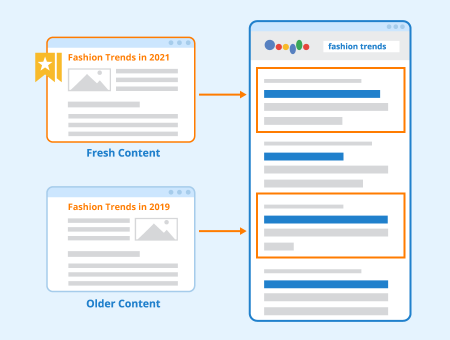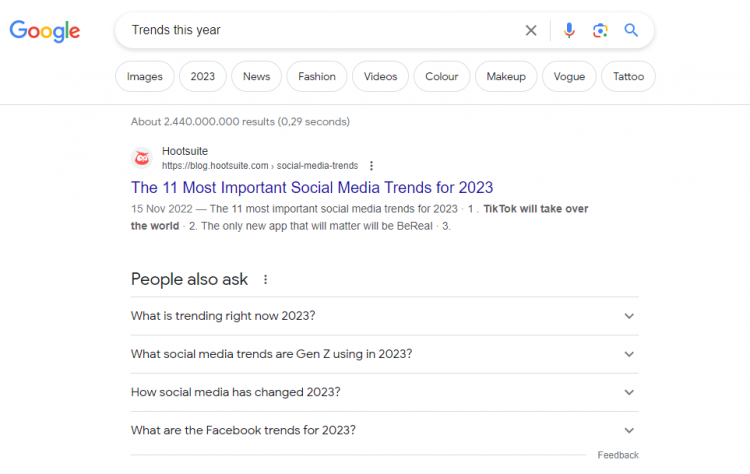Google Freshness
Contents
Google Freshness: An explanation

Google Freshness refers to the Google algorithm update called the “Freshness update” that was rolled out by Google at the end of 2011. Fresh content has been an important part of the search algorithm for a while now, with various updates targeting old and outdated content. Although outdated content can hurt rankings in any SERP, the Freshness update targeted a broad range of specific search results where fresh content was very important. An example of one of these searches is searching for a sporting event since more recent or even future events are usually far more relevant than events that happened years ago (unless the search query indicates otherwise).
The history of freshness in Google search
The Freshness update was the second of two updates that seemed to target outdated content. The first was rolled out in mid-2010 and was coined the Caffeine update. The Caffeine update was focused on indexing and worked to add content to the index much faster. This helped Google index more fresh content as well as new pages, which ultimately made it easier to find recent news and posts.
The Freshness update, which was rolled out just over a year later, focused on ranking more recent content higher on relevant SERPs. Although both updates focused on very different aspects of search, they support each other well, as the Freshness update would not have been as effective without the Caffeine update that came before it.

Image of the Google search results for the search term “trends this year,” which shows search results containing 2023, indicating that fresh content is preferred over older content for this search (search performed in 2023).
When is fresh content most relevant?
Fresh content isn’t always equally important. There are certain types of searches that are far more sensitive to changes over time. Although commonly news-related, there are many other types of searches where freshness is important. This could be searches related to upcoming sports games or tournaments, but also industry trends, recipes, price searches, and various others.
There are also searches where freshness is less relevant. These are usually searches for evergreen content, which is content that stays relevant for a long period of time.
The importance of updating content regularly
Beyond the scope of the Freshness update, regularly updating content is a cornerstone of a robust SEO and content strategy. Regular updates signal to both users and search engines that your site is active and maintained, which can contribute positively to how your website performs. This can help increase how often your website is crawled by search engine crawlers and can help promote trust with your website visitors. As well as ensuring your content is fresh and relevant in the present, updating content also helps in maintaining the accuracy of the information on a page.
When to Update Content
There are many reasons to update content, a number of which include:
- Industry Changes: If there are significant developments in your industry, updating your content to reflect these changes can maintain its relevance and usefulness.
- Outdated Information: Facts, figures, and practices can become outdated. Regular reviews can ensure your content remains accurate.
- User Feedback: Sometimes, users might point out areas of improvement or request additional information. Incorporating this feedback can enhance the quality of your content.
- SEO Performance: If a piece of content is underperforming, updating it with better optimization, keywords, or structure can improve its visibility and drive more traffic to the page.
- Legal or Compliance Updates: Certain industries might require content updates due to changes in laws or regulations.
Summary: The importance of fresh content for SEO
Fresh content can be very important for SEO, especially if your content strategy targets a lot of time-sensitive topics. It’s important to keep track of the changes in your industry and update your posts when important changes happen to ensure you don’t lose your search rankings. Finding out if the content you’re going to be producing is affected by Google Freshness is an important part of your SEO keyword strategy.
It is also commonly advised to use evergreen content in your SEO and content strategy too for diversification purposes. This ensures you don’t take any big hits during important changes or events in your industry. This is content that’s not affected by Google Freshness and can help you create a balance in your SEO and content strategy.
Related links
- https://googleblog.blogspot.com/2011/11/giving-you-fresher-more-recent-search.html
- https://www.searchenginejournal.com/google-algorithm-history/caffeine-update/#close
- https://googleblog.blogspot.com/2010/06/our-new-search-index-caffeine.html
Similar articles
| About the author |
 |